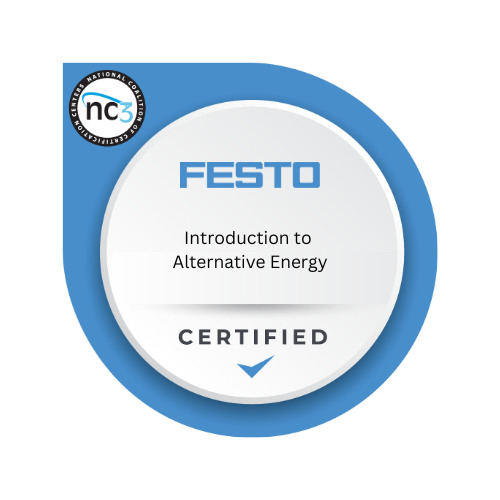Introduction to Alternative Energy Badge Details

Objective
This certification provides participants with both theoretical insights and practical skills in alternative energy, including solar, wind, and hydro energy systems, preparing them for roles in sustainable energy management and design.
The Introduction to Alternative Energy certification provides a comprehensive overview of various energy sources, focusing on renewable energy options and their environmental impact. Participants gain knowledge about different energy types, the fundamentals of energy conversion, and the design considerations necessary for implementing alternative energy systems. The course covers solar, wind, and hydro energy, as well as methods for calculating energy efficiency and implementing sustainable practices.
Through hands-on lab activities and real-world project challenges, learners develop practical skills for measuring, calculating, and optimizing energy use. This certification equips participants with the foundational knowledge needed to evaluate and deploy alternative energy technologies effectively.
Competencies
- Alternative Energy System Knowledge: Demonstrates comprehensive theoretical and practical understanding of various alternative energy sources, including solar, wind, and hydro energy systems.
- Energy Conversion Fundamentals: Explains and applies the fundamental principles of energy conversion relevant to alternative energy technologies.
- System Design Principles: Identifies and applies key design considerations for the implementation of alternative energy systems.
- Energy Efficiency Calculation: Calculates and interprets energy efficiency metrics for diverse energy systems.
- Energy Measurement and Optimization: Utilizes practical skills and tools to measure, calculate, and optimize energy use in various contexts.
- Technology Evaluation and Deployment: Assesses the suitability and effectiveness of alternative energy technologies for deployment in different applications.
- Environmental Impact Analysis: Critically analyzes the environmental impact of various energy options, with a focus on renewable energy sources.
- Sustainable Practice Application: Develops and recommends sustainable practices for effective energy management.
- Problem Identification in Energy Systems: Identifies potential issues and inefficiencies within alternative energy systems.
- Solution Development for Energy Challenges: Formulates practical solutions to optimize energy use and integrate alternative energy technologies.
- Sustainable Energy Management Readiness: Prepares for and effectively contributes to roles within sustainable energy management.
- Alternative Energy Design Contribution: Collaborates on and contributes to the design and implementation of alternative energy projects.
- Practical Application: Applies theoretical insights to real-world project challenges and hands-on laboratory activities.
- Foundational Knowledge Application: Leverages foundational knowledge to make informed decisions regarding alternative energy technologies.
- Adaptability to New Technologies: Demonstrates a readiness to learn and adapt to evolving alternative energy technologies and practices.